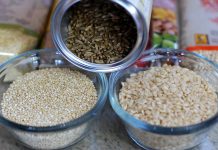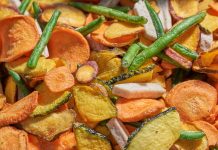
Congratulations, you are doing something to lower your blood cholesterol. A vegetarian diet has many good points that will help you, but it can still be high in total fat though.
Depending on what foods you choose to include in your vegetarian diet, your total fat and cholesterol content may still be too high. An ovo vegetarian does eat eggs in addition to other plant-based foods. An egg yolk is the highest dietary source of cholesterol at 213 milligrams, according to the latest information from the USDA (June 1989). You should limit your egg yolks to four per week. Choose four days of the week to include one egg yolk to help you remember.
If you are a lacto vegetarian, you are including milk and cheese products. Unless you choose low fat or skim milk products, you are still adding fat and cholesterol to your diet.
If you don’t eat eggs or milk and have followed a strict vegetarian diet (vegan), you may still be eating lots of fat. Do you eat nuts (especially macadamia), seeds or coconut? These are high-fat foods and they add up fat quickly. Coconut and palm kernel oils may be found in non-dairy creamers and toppings. They are high in saturated fat which also raises your blood cholesterol.
Another consideration besides what you eat is your weight. Weight loss and exercise will also help lower your blood cholesterol.
The dietary recommendations you should follow are lower total fat intake to 30% of your total calories from fat; lower your food sources of cholesterol to less than 300 milligrams daily; limit saturated fats to equal polyunsaturated fats; lose weight if you are overweight and exercise daily. While I cannot predict how fast your blood cholesterol will come down to under 200 milligrams percent, you should see lower blood cholesterol after one month of following the above dietary guidelines. Blood cholesterol may come down 10% per month. It may take quite a few months on the diet to meet your doctor’s expectations of under 200.


